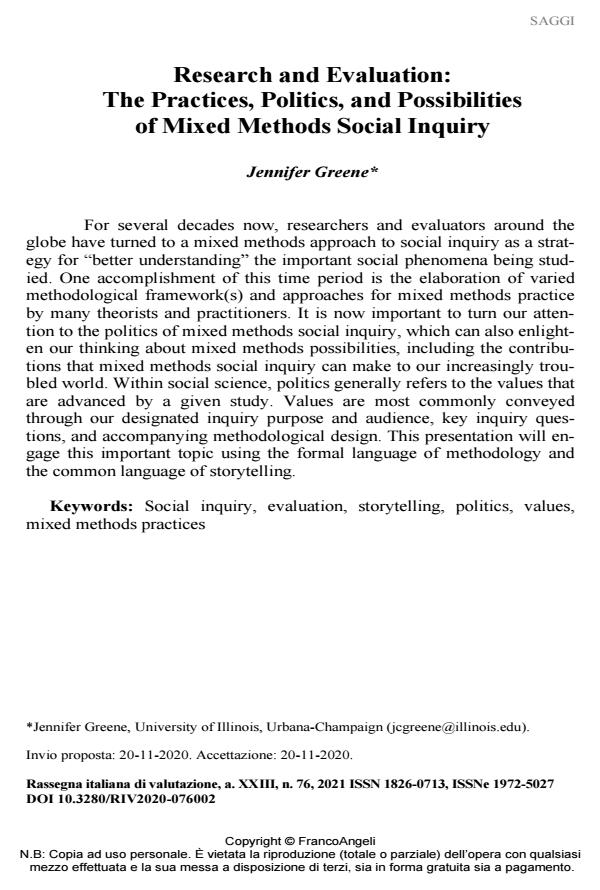Research and Evaluation: The Practices, Politics, and Possibilities of Mixed Methods Social Inquiry
Titolo Rivista RIV Rassegna Italiana di Valutazione
Autori/Curatori Jennifer Greene
Anno di pubblicazione 2021 Fascicolo 2020/76 Lingua Inglese
Numero pagine 14 P. 19-32 Dimensione file 275 KB
DOI 10.3280/RIV2020-076002
Il DOI è il codice a barre della proprietà intellettuale: per saperne di più
clicca qui
Qui sotto puoi vedere in anteprima la prima pagina di questo articolo.
Se questo articolo ti interessa, lo puoi acquistare (e scaricare in formato pdf) seguendo le facili indicazioni per acquistare il download credit. Acquista Download Credits per scaricare questo Articolo in formato PDF

FrancoAngeli è membro della Publishers International Linking Association, Inc (PILA)associazione indipendente e non profit per facilitare (attraverso i servizi tecnologici implementati da CrossRef.org) l’accesso degli studiosi ai contenuti digitali nelle pubblicazioni professionali e scientifiche
For several decades now, researchers and evaluators around the globe have turned to a mixed methods approach to social inquiry as a strategy for "better understanding" the important social phenomena be-ing studied. One accomplishment of this time period is the elaboration of varied methodological framework(s) and approaches for mixed methods practice by many theorists and practitioners. It is now im-portant to turn our attention to the politics of mixed methods social in-quiry, which can also enlighten our thinking about mixed methods pos-sibilities, including the contributions that mixed methods social inquiry can make to our increasingly troubled world. Within social science, politics generally refers to the values that are advanced by a given study. Values are most commonly conveyed through our designated inquiry purpose and audience, key inquiry questions, and accompany-ing methodological design. This presentation will engage this important topic using the formal language of methodology and the common lan-guage of storytelling.
Keywords:Social inquiry, evaluation, storytelling, politics, values, mixed methods practices
- Bazeley P. (2018), Integrating analyses in mixed methods research. Los Angeles, CA: Sage.
- Greene J.C., Caracelli V.J., & Graham W.F. (1989), Toward a conceptual framework for mixed-method evaluation designs. Educational Evaluation and Policy Analysis, 11, 255-274.
- Moss P.A., Phillips D.C., Erickson F.D., Floden R.E., Lather P.A, and Schneider B.L. (2009), Educational Researcher, 38(6), 501-517.
- Sandelowski M., Voils C.I., and Knafl G. (2009), On quantitizing, Journal of Mixed Methods Research, 3(3), 208-222.
- Ungar M., and Liebenberg L. (2011), Assessing resilience across cultures using mixed methods: Construction of the Child and Youth Resilience Measure. Journal of Mixed Methods Research, 5(2), 126-149.
- Ungar M. (2008), Resilience across cultures. British Journal of Social Work, 38(2), 218-235.
- This paper was originally presented at a Roundtable Conference, on January 21,2020, hosted by the Department of Sociology and Social Research, at the University of Milano-Bicocca.
- Mixed Methods e valutazione democratica Nicoletta Stame, in RIV Rassegna Italiana di Valutazione 76/2021 pp.53
DOI: 10.3280/RIV2020-076004
Jennifer Greene, Research and Evaluation: The Practices, Politics, and Possibilities of Mixed Methods Social Inquiry in "RIV Rassegna Italiana di Valutazione" 76/2020, pp 19-32, DOI: 10.3280/RIV2020-076002